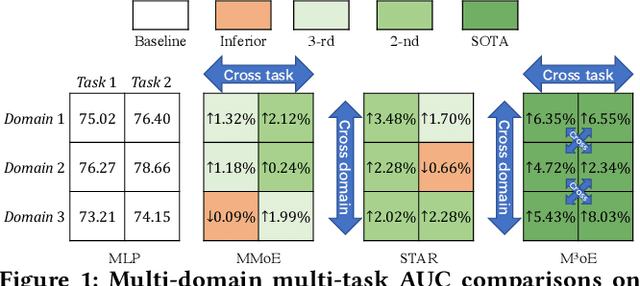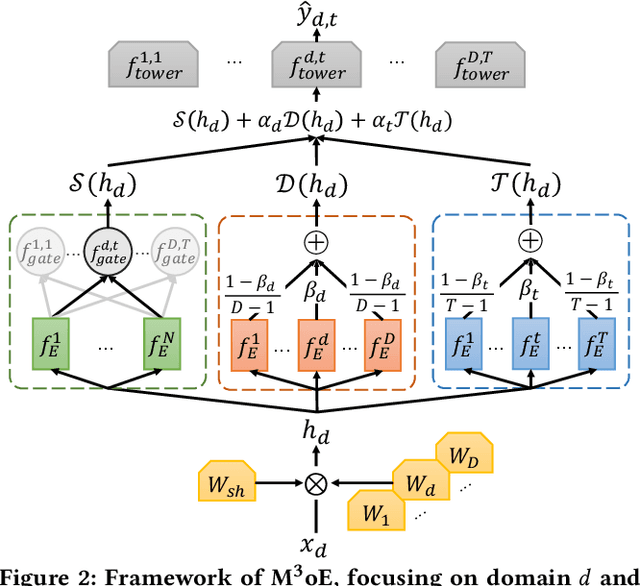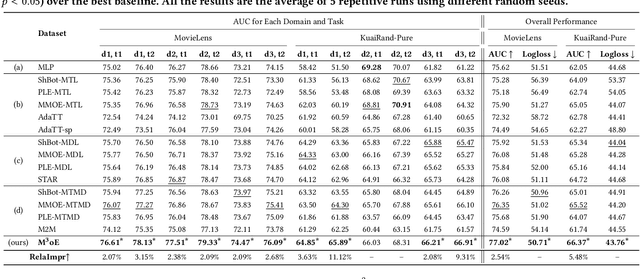Chunxu Zhang
FedDis: A Causal Disentanglement Framework for Federated Traffic Prediction
Jan 30, 2026Abstract:Federated learning offers a promising paradigm for privacy-preserving traffic prediction, yet its performance is often challenged by the non-identically and independently distributed (non-IID) nature of decentralized traffic data. Existing federated methods frequently struggle with this data heterogeneity, typically entangling globally shared patterns with client-specific local dynamics within a single representation. In this work, we postulate that this heterogeneity stems from the entanglement of two distinct generative sources: client-specific localized dynamics and cross-client global spatial-temporal patterns. Motivated by this perspective, we introduce FedDis, a novel framework that, to the best of our knowledge, is the first to leverage causal disentanglement for federated spatial-temporal prediction. Architecturally, FedDis comprises a dual-branch design wherein a Personalized Bank learns to capture client-specific factors, while a Global Pattern Bank distills common knowledge. This separation enables robust cross-client knowledge transfer while preserving high adaptability to unique local environments. Crucially, a mutual information minimization objective is employed to enforce informational orthogonality between the two branches, thereby ensuring effective disentanglement. Comprehensive experiments conducted on four real-world benchmark datasets demonstrate that FedDis consistently achieves state-of-the-art performance, promising efficiency, and superior expandability.
TimeEmb: A Lightweight Static-Dynamic Disentanglement Framework for Time Series Forecasting
Oct 01, 2025Abstract:Temporal non-stationarity, the phenomenon that time series distributions change over time, poses fundamental challenges to reliable time series forecasting. Intuitively, the complex time series can be decomposed into two factors, \ie time-invariant and time-varying components, which indicate static and dynamic patterns, respectively. Nonetheless, existing methods often conflate the time-varying and time-invariant components, and jointly learn the combined long-term patterns and short-term fluctuations, leading to suboptimal performance facing distribution shifts. To address this issue, we initiatively propose a lightweight static-dynamic decomposition framework, TimeEmb, for time series forecasting. TimeEmb innovatively separates time series into two complementary components: (1) time-invariant component, captured by a novel global embedding module that learns persistent representations across time series, and (2) time-varying component, processed by an efficient frequency-domain filtering mechanism inspired by full-spectrum analysis in signal processing. Experiments on real-world datasets demonstrate that TimeEmb outperforms state-of-the-art baselines and requires fewer computational resources. We conduct comprehensive quantitative and qualitative analyses to verify the efficacy of static-dynamic disentanglement. This lightweight framework can also improve existing time-series forecasting methods with simple integration. To ease reproducibility, the code is available at https://github.com/showmeon/TimeEmb.
Learn to Preserve Personality: Federated Foundation Models in Recommendations
Jun 13, 2025Abstract:A core learning challenge for existed Foundation Models (FM) is striking the tradeoff between generalization with personalization, which is a dilemma that has been highlighted by various parameter-efficient adaptation techniques. Federated foundation models (FFM) provide a structural means to decouple shared knowledge from individual specific adaptations via decentralized processes. Recommendation systems offer a perfect testbed for FFMs, given their reliance on rich implicit feedback reflecting unique user characteristics. This position paper discusses a novel learning paradigm where FFMs not only harness their generalization capabilities but are specifically designed to preserve the integrity of user personality, illustrated thoroughly within the recommendation contexts. We envision future personal agents, powered by personalized adaptive FMs, guiding user decisions on content. Such an architecture promises a user centric, decentralized system where individuals maintain control over their personalized agents.
Incomplete Graph Learning: A Comprehensive Survey
Feb 18, 2025Abstract:Graph learning is a prevalent field that operates on ubiquitous graph data. Effective graph learning methods can extract valuable information from graphs. However, these methods are non-robust and affected by missing attributes in graphs, resulting in sub-optimal outcomes. This has led to the emergence of incomplete graph learning, which aims to process and learn from incomplete graphs to achieve more accurate and representative results. In this paper, we conducted a comprehensive review of the literature on incomplete graph learning. Initially, we categorize incomplete graphs and provide precise definitions of relevant concepts, terminologies, and techniques, thereby establishing a solid understanding for readers. Subsequently, we classify incomplete graph learning methods according to the types of incompleteness: (1) attribute-incomplete graph learning methods, (2) attribute-missing graph learning methods, and (3) hybrid-absent graph learning methods. By systematically classifying and summarizing incomplete graph learning methods, we highlight the commonalities and differences among existing approaches, aiding readers in selecting methods and laying the groundwork for further advancements. In addition, we summarize the datasets, incomplete processing modes, evaluation metrics, and application domains used by the current methods. Lastly, we discuss the current challenges and propose future directions for incomplete graph learning, with the aim of stimulating further innovations in this crucial field. To our knowledge, this is the first review dedicated to incomplete graph learning, aiming to offer valuable insights for researchers in related fields.We developed an online resource to follow relevant research based on this review, available at https://github.com/cherry-a11y/Incomplete-graph-learning.git
LLM-Powered User Simulator for Recommender System
Dec 22, 2024



Abstract:User simulators can rapidly generate a large volume of timely user behavior data, providing a testing platform for reinforcement learning-based recommender systems, thus accelerating their iteration and optimization. However, prevalent user simulators generally suffer from significant limitations, including the opacity of user preference modeling and the incapability of evaluating simulation accuracy. In this paper, we introduce an LLM-powered user simulator to simulate user engagement with items in an explicit manner, thereby enhancing the efficiency and effectiveness of reinforcement learning-based recommender systems training. Specifically, we identify the explicit logic of user preferences, leverage LLMs to analyze item characteristics and distill user sentiments, and design a logical model to imitate real human engagement. By integrating a statistical model, we further enhance the reliability of the simulation, proposing an ensemble model that synergizes logical and statistical insights for user interaction simulations. Capitalizing on the extensive knowledge and semantic generation capabilities of LLMs, our user simulator faithfully emulates user behaviors and preferences, yielding high-fidelity training data that enrich the training of recommendation algorithms. We establish quantifying and qualifying experiments on five datasets to validate the simulator's effectiveness and stability across various recommendation scenarios.
Multifaceted User Modeling in Recommendation: A Federated Foundation Models Approach
Dec 22, 2024



Abstract:Multifaceted user modeling aims to uncover fine-grained patterns and learn representations from user data, revealing their diverse interests and characteristics, such as profile, preference, and personality. Recent studies on foundation model-based recommendation have emphasized the Transformer architecture's remarkable ability to capture complex, non-linear user-item interaction relationships. This paper aims to advance foundation model-based recommendersystems by introducing enhancements to multifaceted user modeling capabilities. We propose a novel Transformer layer designed specifically for recommendation, using the self-attention mechanism to capture sequential user-item interaction patterns. Specifically, we design a group gating network to identify user groups, enabling hierarchical discovery across different layers, thereby capturing the multifaceted nature of user interests through multiple Transformer layers. Furthermore, to broaden the data scope and further enhance multifaceted user modeling, we extend the framework to a federated setting, enabling the use of private datasets while ensuring privacy. Experimental validations on benchmark datasets demonstrate the superior performance of our proposed method. Code is available.
A Tutorial of Personalized Federated Recommender Systems: Recent Advances and Future Directions
Dec 11, 2024Abstract:Personalization stands as the cornerstone of recommender systems (RecSys), striving to sift out redundant information and offer tailor-made services for users. However, the conventional cloud-based RecSys necessitates centralized data collection, posing significant risks of user privacy breaches. In response to this challenge, federated recommender systems (FedRecSys) have emerged, garnering considerable attention. FedRecSys enable users to retain personal data locally and solely share model parameters with low privacy sensitivity for global model training, significantly bolstering the system's privacy protection capabilities. Within the distributed learning framework, the pronounced non-iid nature of user behavior data introduces fresh hurdles to federated optimization. Meanwhile, the ability of federated learning to concurrently learn multiple models presents an opportunity for personalized user modeling. Consequently, the development of personalized FedRecSys (PFedRecSys) is crucial and holds substantial significance. This tutorial seeks to provide an introduction to PFedRecSys, encompassing (1) an overview of existing studies on PFedRecSys, (2) a comprehensive taxonomy of PFedRecSys spanning four pivotal research directions-client-side adaptation, server-side aggregation, communication efficiency, privacy and protection, and (3) exploration of open challenges and promising future directions in PFedRecSys. This tutorial aims to establish a robust foundation and spark new perspectives for subsequent exploration and practical implementations in the evolving realm of RecSys.
Efficient and Robust Regularized Federated Recommendation
Nov 03, 2024



Abstract:Recommender systems play a pivotal role across practical scenarios, showcasing remarkable capabilities in user preference modeling. However, the centralized learning paradigm predominantly used raises serious privacy concerns. The federated recommender system (FedRS) addresses this by updating models on clients, while a central server orchestrates training without accessing private data. Existing FedRS approaches, however, face unresolved challenges, including non-convex optimization, vulnerability, potential privacy leakage risk, and communication inefficiency. This paper addresses these challenges by reformulating the federated recommendation problem as a convex optimization issue, ensuring convergence to the global optimum. Based on this, we devise a novel method, RFRec, to tackle this optimization problem efficiently. In addition, we propose RFRecF, a highly efficient version that incorporates non-uniform stochastic gradient descent to improve communication efficiency. In user preference modeling, both methods learn local and global models, collaboratively learning users' common and personalized interests under the federated learning setting. Moreover, both methods significantly enhance communication efficiency, robustness, and privacy protection, with theoretical support. Comprehensive evaluations on four benchmark datasets demonstrate RFRec and RFRecF's superior performance compared to diverse baselines.
Federated Adaptation for Foundation Model-based Recommendations
May 08, 2024



Abstract:With the recent success of large language models, particularly foundation models with generalization abilities, applying foundation models for recommendations becomes a new paradigm to improve existing recommendation systems. It becomes a new open challenge to enable the foundation model to capture user preference changes in a timely manner with reasonable communication and computation costs while preserving privacy. This paper proposes a novel federated adaptation mechanism to enhance the foundation model-based recommendation system in a privacy-preserving manner. Specifically, each client will learn a lightweight personalized adapter using its private data. The adapter then collaborates with pre-trained foundation models to provide recommendation service efficiently with fine-grained manners. Importantly, users' private behavioral data remains secure as it is not shared with the server. This data localization-based privacy preservation is embodied via the federated learning framework. The model can ensure that shared knowledge is incorporated into all adapters while simultaneously preserving each user's personal preferences. Experimental results on four benchmark datasets demonstrate our method's superior performance. Implementation code is available to ease reproducibility.
M3oE: Multi-Domain Multi-Task Mixture-of Experts Recommendation Framework
Apr 29, 2024



Abstract:Multi-domain recommendation and multi-task recommendation have demonstrated their effectiveness in leveraging common information from different domains and objectives for comprehensive user modeling. Nonetheless, the practical recommendation usually faces multiple domains and tasks simultaneously, which cannot be well-addressed by current methods. To this end, we introduce M3oE, an adaptive multi-domain multi-task mixture-of-experts recommendation framework. M3oE integrates multi-domain information, maps knowledge across domains and tasks, and optimizes multiple objectives. We leverage three mixture-of-experts modules to learn common, domain-aspect, and task-aspect user preferences respectively to address the complex dependencies among multiple domains and tasks in a disentangled manner. Additionally, we design a two-level fusion mechanism for precise control over feature extraction and fusion across diverse domains and tasks. The framework's adaptability is further enhanced by applying AutoML technique, which allows dynamic structure optimization. To the best of the authors' knowledge, our M3oE is the first effort to solve multi-domain multi-task recommendation self-adaptively. Extensive experiments on two benchmark datasets against diverse baselines demonstrate M3oE's superior performance. The implementation code is available to ensure reproducibility.
 Add to Chrome
Add to Chrome Add to Firefox
Add to Firefox Add to Edge
Add to Edge